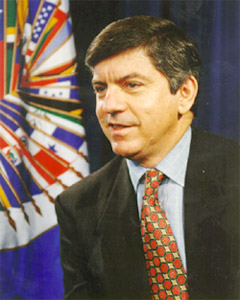
Former Colombian President César Gaviria—known in Latin
America as a conflict mediator, advocate of democracy in 1999, staunch
supporter of regional integration and defender of human rights—was first
elected OAS Secretary General in 1994. He was re-elected by the
member-countries in 1999, and began his second term in September of that year.
Through his strategy for a “New Vision of the OAS,” César
Gaviria has fostered profound institutional changes that have reinvigorated the
inter-American agenda and prepared the Organization to meet the challenges the
region faces today. Administrative reforms have made it possible for the OAS to
expand its activities, despite the scarcity of resources, and to strengthen key
programs. The adoption of the Inter-American Democratic Charter, in 2001,
established the region’s unequivocal commitment to democracy and human rights.
The National Democratic Institute paid tribute to Secretary General Gaviria’s
leadership and the Organization’s growing role in strengthening democratic
values when it presented the OAS with the 2002 W. Averell Harriman Democracy
Award.
During Gaviria’s tenure, the OAS has also intensified
efforts to improve hemispheric security and combat terrorism, drugs and
corruption. It has become a key player in the Summit of the Americas process,
and now serves as its technical secretariat and institutional memory. The
Organization has also advanced the concept of integral solidarity and has
reformed its technical cooperation programs.
Gaviria has been instrumental in defusing numerous crises in
the region, most recently the tensions in Venezuela. From November 2002 to May
2003, he undertook an unprecedented effort to facilitate talks between the
Venezuelan government and representatives of the opposition. The negotiations
formally ended with an agreement between the two sides that opens the door for
the “peaceful, democratic, electoral and constitutional” outcome the
international community had sought.
César Gaviria began his career at age 23, immediately after
obtaining his degree in Economics from Universidad de los Andes in Bogotá, when
he was elected councilman in his hometown of Pereira. Four years later, he
became mayor. He was also professor of Principles of Economics and Public
Finance at Universidad de los Andes during 1971 and also taught a seminar level
course on Colombian Economics between 1972 and 1974 at the Universidad
Tecnológica de Pereira.
In 1974 he was elected to Colombia’s House of
Representatives. He rose to the top position in the House in 1983. Between 1983
and 1986 Gaviria was also economic columnist for El Tiempo, his country’s
leading newspaper, and director of La Tarde, a regional paper based in his
hometown.
In 1986 Gaviria became co-chair of the Colombian Liberal
Party, a position he held during the successful presidential campaign of the
party’s candidate, Virgilio Barco.
Mr. Gaviria served in the Barco administration first as
Minister of Finance and later as Minister of the Interior. He played a critical
role in beginning peace negotiations with the leftist guerrilla group known as
“M-19.”
In early 1989, he left the government to manage the
presidential campaign of Senator Luis Carlos Galán. Following the brutal murder
of Senator Galán by drug traffickers, the Liberal Party chose César Gaviria as
its candidate. He was elected President of Colombia in May 1990.
During his four-year term (1990-94) he enacted policies to
strengthen democracy, promote peace and reintegrate armed rebels into civilian
life. He also carried out a process of constitutional and institutional change,
focusing on strengthening the judiciary branch and increasing human rights
protection. In 1991, through a plebiscite and elected constitutional assembly,
Colombia drafted a new, more democratic constitution. President Gaviria also
undertook economic reforms to modernize and enhance Colombia’s competitiveness
in the world market. He presided over the signing of free trade agreements
between the members of the “Group of Three” (Mexico, Colombia, and Venezuela)
and between Colombia and CARICOM, and initiated the revitalization of the
Andean Pact.
Recent Awards:
W. Averell Harriman Democracy Award, (2002)
National Democratic Institute (NDI) Democracy Award (2002)
The Washington Times International Courage in Leadership
Award (2002)
Honorary Degrees:
Honorary Doctorate in Civil Law, from Northeastern
University (2002)
Professor Honoris Causa from the Universidade Estácio de Sá,
Rio de Janeiro (1991)
Professor Honoris Causa from Universidad Libre Colombia
(1990)
Professor Honoris Causa from University of Miami
Professor Honoris Causa from Universidad ICESI, Colombia
Main Active Memberships:
Inter-American Dialogue
Club de Madrid
La Conférence de Montréal
Publications:
“El Sistema Interamericano para la Protección de y Promoción
de los Derechos Humanos”, in El Futuro del Sistema Inter.-Americano de
Protección de los Derechos Humanos, Juan Méndez y Francisco Cox, Ed., 2001.
"La integración regional en un mundo globalizado:
liderazgos, desafíos y capacidad de gestión", in Memorias del IV Congreso
Internacional del CLAD, CLAD, 2000.
Toward the New Millennium: The road traveled 1994-1999,
Organization of American States, 1999.
“Toward a New Vision of the Inter-American Human Rights
System.” published in Boletim da Sociedade Brasileira de Dereito Internacional
N. 113/118, 1998. Also published in Journal of Latin American Affairs 3.1,
1995.
A New Vision of the OAS, Organization of American States,
1995.
Plan de Desarrollo Económico y Social 1990 – 1994,
Presidencia de la República de Colombia, 1994.
Reformas Económicas 1990 – 1994, Presidencia de la República
de Colombia, 1994.
Las Bases de la Nueva Colombia: El Revolcón Institucional
1990 –1994, Presidencia de la República de Colombia, 1994.
La Revolución Pacífica, Presidencia de la República de
Colombia, 1990.
Reflexiones para una nueva Constitución, Presidencia de la
República de Colombia, 1990.
La Deuda Latinoamericana, Cámara de Representantes de
Colombia, 1982.
|


